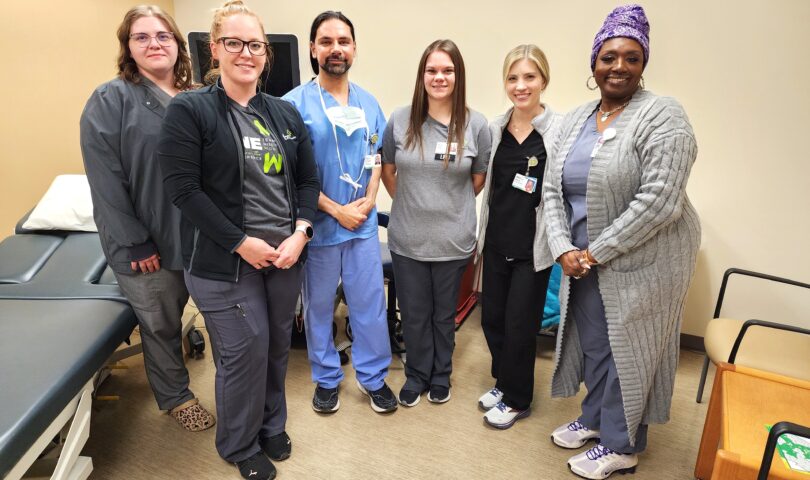MORGANTOWN – Mon Health Heart & Vascular Center’s electrophysiology program is the first and only such program in the state to receive the American College of Cardiology electrophysiology accreditation.
Program medical director Dr. Salam Sbaity explained what electrophysiology is. It deals with heart rhythm problems, such as AFIB. “We’re like the electricians of the heart.” The cardiac plumbers deal with the blood vessels, and he deals with the electrical system.
They deal with slow and fast rhythms, with symptoms such as palpitations, dizziness and passing out, with heart failure with risk of sudden cardiac death.
They might treat problems with cardiac devices such as pacemakers or defibrillators. “We are pioneers in the emerging field of leadless pacemakers.”
But most of their work is ablation – going into the heart with catheters to freeze (cryoablation) or cauterize (radio frequency ablation) the abnormal rhythm. They used to do it with flouroscopy, but now with ultrasound without radiation.
“ We are also acquiring the new technology of pulsed field ablation that was just approved by FDA and will perform the first case in the state this month,” Sbaity said.
Boston Scientific, the developer of PFA, describes it this way: “Unlike thermal ablation that causes cell death by local tissue temperature, pulsed field ablation applies ultra-rapid electrical pulses above a tissue cell’s specific electrical threshold, destabilizing the cell membrane and forming nanoscale pores that cause the cell’s contents to exit resulting in the cell death.”
His program teammates are Drs. Matthew Gaskill and Kenneth Judson.
Sbaity briefly explained in an interview and then elaborated in an email what the accreditation means.
“It ensures to our patients that they will receive the highest quality of care by an exceptional team utilizing state of the art medical technology, and who have proven to consistently deliver outstanding patient outcomes through a rigorous process. It allows us to set the gold standard for heart rhythm care in the state of West Virginia and pave the way to increased access to quality care in the state.”
The American College of Cardiology describes the criteria it uses to award the accreditation:
- Governance: optimization of the organizational platform to align dedicated personnel, operational program model, staff education, and service alignment;
- Quality: continuous process improvement of all aspects of care;
- Pre-Procedure: dedicated to the evaluation of risk and readiness assessment through multidisciplinary screening processes and protocols to ensure the electrophysiology procedure is as safe and effective as possible;
- Peri-Procedure: focused on interdisciplinary care coordination and communication surrounding sedation, infection control, radiation safety, and universal timeout protocols;
- Post-Procedure: protocols and policies for appropriate handoff, site management, patient and family communication and education, and discharge instructions to promote recovery;
- Clinical Quality: process improvement initiatives derived from outcomes and metrics related to the facility.
The Heart & Vascular Center applied for the accreditation, he said, and the review process took more than 18 months, including a rigorous site visit.
The accreditation is good for three years, he said, but is reviewed annually. “We have to continue to show improvement every year.”
Email: dbeard@dominionpost.com




